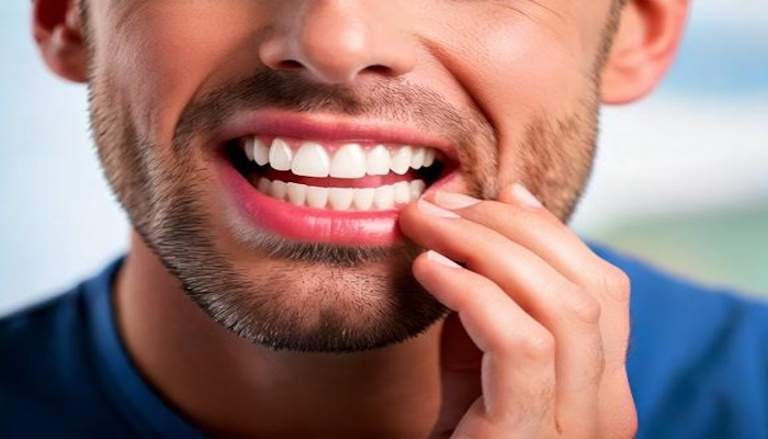How To Stop Clenching Your Jaw At Night: Causes, Symptoms, and Effective Remedies
How to stop clenching jaws at night is a common question for many individuals who unknowingly suffer from grinding their teeth at night. This condition, medically known as bruxism, can cause significant discomfort, damage to your teeth, and even long-term health issues if left untreated.
If you wake up with jaw pain, headaches, or sore teeth, you might be unknowingly grinding your teeth during sleep.
In this article, we’ll dive deep into how to recognize, manage, and treat jaw clenching at night using both natural remedies and professional help. We’ll also explore the symptoms of bruxism, causes, and steps you can take immediately to relieve pain and protect your oral health.
What Is Bruxism?
Bruxism refers to the involuntary grinding, clenching, or gnashing of teeth. While some people experience awake bruxism, where clenching happens during the day, most cases occur during sleep, known as sleep bruxism. This nighttime habit is particularly harmful because it’s harder to control or even detect without help.
Sleep bruxism is often linked to:
- Stress or anxiety
- Misaligned teeth
- Sleep disorders like apnea
- Certain medications
- Neurological conditions

Jaw Clenching Symptoms to Watch Out For
Recognizing the signs of nighttime jaw clenching is essential. Since the condition occurs during sleep, many people are unaware they even do it. However, there are clear indicators to look for.
Morning Discomfort and Pain
- Dull headaches upon waking
- Sore or tight jaw muscles
- Neck or shoulder stiffness
- Pain around your temples
Dental and Oral Symptoms
- Increased tooth sensitivity
- Flattened or worn-down teeth
- Cracked or chipped teeth
- Loose teeth
- Gum inflammation (gingivitis)
- Sores inside your cheeks from biting
Audible Sounds While Sleeping
In many cases, your sleeping partner may hear loud grinding noises during the night. If you sleep alone, consider using a sleep recorder app or device to monitor nocturnal activity.
How to Confirm If You Have Bruxism
Diagnosing bruxism can be challenging, especially without visible symptoms. However, a few strategies can help confirm the condition:
Ask Your Sleeping Partner
If you share your bed with someone, ask if they’ve noticed you grinding or clenching during sleep. They might hear telltale noises or see your facial muscles tensing up.
Record Your Sleep
Use a smartphone app or sleep tracker to record nighttime sounds. This can help you detect any grinding or clenching activity while you sleep.
Visit Your Dentist
Your dentist can examine your mouth for signs of bruxism, such as enamel wear, jaw tenderness, or alignment issues. They may also evaluate for underlying conditions like:
- TMJ Disorder (Temporomandibular Joint Dysfunction)
- Dental malocclusion (bite misalignment)
- Ear disorders or infections
5 Proven Ways to Stop Clenching Your Jaw At Night
Now that you understand what causes bruxism and how to recognize it, let’s explore how to stop clenching your jaw at night using a mix of lifestyle changes and expert advice.
1. Stress Management Techniques
Since stress is a leading cause of bruxism, learning to manage it is key. Try these relaxation methods:
- Meditation or mindfulness practices
- Deep breathing exercises before bed
- Journaling to offload daily worries
- Practicing gentle yoga stretches
2. Wear a Night Guard
A custom-made night guard from your dentist creates a barrier between your upper and lower teeth, preventing damage from grinding. Over-the-counter versions are available, but professionally fitted ones are more effective.
3. Improve Your Sleep Hygiene
Better sleep habits can reduce nighttime jaw tension:
- Avoid caffeine and alcohol before bed
- Set a consistent bedtime and wake time
- Keep your bedroom dark, cool, and quiet
- Avoid screen time 1 hour before sleeping
4. Jaw Exercises and Physical Therapy
Physical therapy can help release tension in your temporomandibular joint (TMJ) and strengthen jaw muscles. Try:
- Gentle jaw stretches
- Massaging the jaw and neck
- Applying warm compresses before sleeping
5. Monitor Your Daytime Jaw Habits
Many people unconsciously clench their jaws during the day. Catching yourself in the act and relaxing your facial muscles can prevent it from becoming a nighttime habit. Try these tips:
- Set hourly phone reminders to “check your jaw”
- Place your tongue between your teeth briefly to break the habit
- Practice keeping your lips closed but teeth slightly apart
Natural Remedies for Jaw Clenching at Night
If you’re seeking home treatments for bruxism, several natural remedies may help reduce symptoms:
- Magnesium supplements: Magnesium helps relax muscles and nerves
- Valerian root or chamomile tea: Promote relaxation before bed
- Essential oils like lavender can reduce stress when diffused or applied topically
- Epsom salt baths: Relax the entire body, including the jaw
When To Seek Professional Help
If home remedies and lifestyle changes don’t reduce symptoms, consult a professional. Chronic jaw clenching at night can lead to:
- TMJ disorders
- Permanent damage to teeth
- Sleep disruption
- Facial pain and headaches
Your dentist may recommend further testing, refer you to a sleep specialist, or prescribe a muscle relaxant. In some cases, Botox injections are used to reduce jaw tension in severe cases.
Conclusion
Learning how to stop clenching jaw at night is essential for preserving your dental health and overall well-being. While the condition may seem minor at first, ignoring it can lead to more serious complications. By understanding the causes, recognizing the symptoms, and applying the right treatments — from stress reduction to dental solutions — you can break the cycle of bruxism and enjoy more restful, pain-free sleep.






